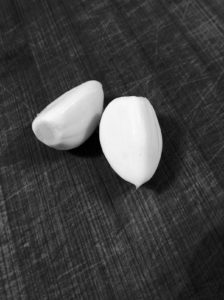False.
GARLIC (ALLIUM SATIVUM) is often used to flavor foods and is well known for its strong, distinctive odor. Because of its aromatic properties, garlic is sometimes affectionately referred to as the “stinking rose.”
Many years ago my wife and I went to San Francisco to attend a conference, and while on a long walk we came across a restaurant called The Stinking Rose. She LOVES garlic, so we decided to stop for dinner.
I’ll never forget the overwhelming smell of garlic when we walked in the door. I’ll also never forget the first item on the menu: 50 Clove Garlic Chicken Breast—chicken breast adorned with 50 cloves of garlic. My wife was in heaven!
Garlic contains allicin, which has been shown to kill some bacteria and fungi. Garlic is touted for having many health benefits such as preventing colds and the flu as well as lowering high blood pressure and cholesterol.
But let’s focus on whether garlic is effective at lowering cholesterol, and let’s begin by reviewing the two types of cholesterol we measure: LDL and HDL.
LDL, or low-density lipoprotein (often called bad cholesterol), is a fat/ protein complex that carries cholesterol to the arteries and contributes to cardiovascular disease.
HDL, or high-density lipoprotein (often called good cholesterol), is a fat/ protein complex that carries cholesterol from the arteries to the liver for removal and helps decrease the risk of cardiovascular disease.
Health professionals recommend keeping total cholesterol below 200 mg/dl and LDL cholesterol below 100 mg/dl. Ideally, HDL should be 60 mg/dl or higher.
Now back to garlic. Garlic can be eaten raw or can be taken as a supplement available as a powder, tablet or capsule. Garlic is generally considered to be safe, but there can be some mild side effects from garlic such as bad breath, general body odor and gastrointestinal distress.
It is also important to note that garlic can affect the body’s ability to clot blood, so individuals taking a blood thinner should talk to their physician if they decide to start eating lots of garlic or taking a garlic supplement.
The author Khoo (2009) published a meta-analysis in the Journal of Clinical Pharmacy and Therapeutics on whether garlic lowers cholesterol levels. Khoo identified 1,228 research articles on garlic and, using strict inclusion criteria to ensure that he chose only studies of the highest quality, identified 13 research studies that tested 1,056 subjects. Khoo’s findings: “The available evidence from randomized controlled trials does not demonstrate any beneficial effects of garlic on serum cholesterol.”
Khoo also states that recommendations by proponents of complementary and alternative medicine to increase garlic consumption as a way to reduce the risk of cardiovascular disease should be viewed with caution.
I’m not a huge garlic fan, but I do think it adds a desirable flavor to many of the foods we prepare at home. If my wife and I ever take another trip to San Francisco, you can bet that we will likely make a repeat visit to The Stinking Rose restaurant.
Khoo., Y.: Garlic supplementation and serum cholesterol: a meta-analysis. Journal of Clinical Pharmacy and Therapeutics (2009), Vol 34, pp. 133-145.
